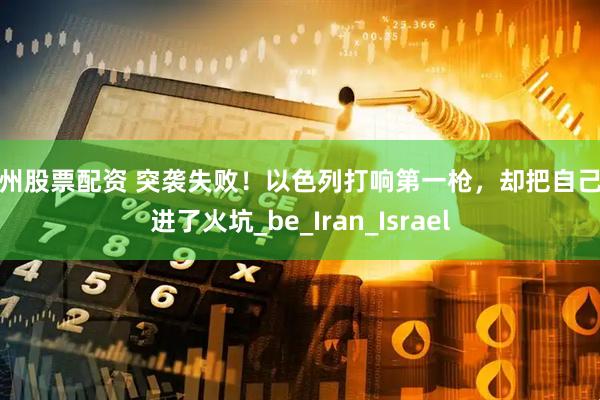
Don’t underestimate Iran as a soft target that can be easily squeezed.广州股票配资
At the beginning of this month, Israel launched what it called a \"preemptive strike\" targeting Iran’s nuclear facilities.
However, Iran was far from intimidated—instead, it responded with lightning speed, catching Israel completely off guard.
Even more significant, this conflict quickly spilled beyond borders, drawing sharp attention from the Shanghai Cooperation Organization, Russia, and China, putting the global spotlight back on this volatile region.
展开剩余89%In hindsight, it’s clear that Netanyahu seriously miscalculated with this move.
In early June, Israel’s airstrikes on Iran were officially justified by a straightforward aim: to stop Iran from developing nuclear weapons.
But the reality is far more complex.
The term “preemptive” was more of a smokescreen than a genuine explanation.
Inside Israel, unrest was already brewing.
Mass protests erupted, the economy was faltering, and Netanyahu’s popularity was plummeting. Even street vendors lamented, “This government only knows how to cause trouble, prices have doubled.”
For Netanyahu, war became a convenient tool to divert public anger and internal tensions.
But Iran is no paper tiger—this time, its retaliation was swift and precise.
Missiles and drones struck Israel’s key military bases in rapid succession, as if rehearsed beforehand.
A former Israeli officer, interviewed later, grimly noted, “They know exactly where we are and when we are most vulnerable.”
His words sent a chilling message.
The Gulf confrontation wasn’t just posturing—it was a humiliating blow.
Right after Israel’s strikes, the UK deployed a destroyer to the Gulf, attempting to assert “stability” in the region.
On paper, this should have been an intimidating show of force.
Yet, Iran countered unexpectedly by deploying drones that forced the British warship to halt.
A multi-million-pound destroyer brought to a standstill by inexpensive drones—this was a stunning embarrassment for the UK.
What was meant to be a demonstration of power quickly turned into a spectacle of shame.
The footage circulated widely on social media, with Iranian users sarcastically commenting, “Next time, please bring the handbrake.” The mockery was palpable.
Iran’s counterattack wasn’t limited to missiles; it played the diplomatic game just as effectively.
Iran’s foreign minister rushed to the United Nations, accusing Israel of violating international law and demanding sanctions.
Unlike in the past, Iran wasn’t isolated this time—the Shanghai Cooperation Organization stepped up in support.
Putin personally called Netanyahu, warning, “Your actions have crossed the line.”
This was no empty diplomatic phrase but a final stern warning after repeated provocations.
Meanwhile, China took a bold stance by suspending its payments to the International Atomic Energy Agency, citing the agency’s excessive politicization and refusing to be involved.
This move was both a protest and a clear signal: China is not a mere bystander but an active player in this geopolitical chess game.
The Shanghai Cooperation Organization has moved beyond being a mere “political talk shop.”
This time, it didn’t stop at issuing condemnations against Israel; it declared its readiness to take “concrete actions” to safeguard member states’ interests.
This warning is serious.
It implies not only rhetoric but potential deployment of troops, technology, or resources.
With Putin and China deeply involved, this bloc’s influence is becoming tangible and formidable.
While India chose to stay silent in this storm—avoiding taking sides amid its balancing act between the US and SCO—Pakistan made its position clear.
Pakistan openly declared support for Iran and even hinted at providing assistance if necessary.
This stance shifted the dynamics considerably.
In recent years, Pakistan and Iran have warmed ties significantly, with growing economic partnerships and frequent military cooperation.
Their joint stand now serves as a sort of “live-fire exercise” reinforcing their alliance.
Israel’s isolation and difficulties are only beginning.
What Israel thought would be a decisive strike turned into a fatal misstep.
Its missile attacks failed to neutralize the threat and instead provoked a coalition of opposition.
The Houthi militia also joined in, launching missiles directly at Tel Aviv, turning the conflict from a one-on-one into a multi-front battle.
The US deployed the Nimitz aircraft carrier to back Israel, but its impact remains limited.
Even more embarrassing, several US defense systems—Patriot, THAAD, and Iron Dome—failed to intercept all incoming attacks during this escalation.
In conclusion, Israel’s so-called “preemptive strike” backfired spectacularly.
Instead of enhancing security, it unleashed a Pandora’s box of military retaliation and diplomatic backlash.
The collective response from Iran and the SCO turned a domestic political distraction into an international crisis.
Putin’s words resonate deeply: “No country is above the rules.”
His message is not just for Israel but for anyone who tries to rewrite global order through brute force.广州股票配资
发布于:天津市卓信宝提示:文章来自网络,不代表本站观点。